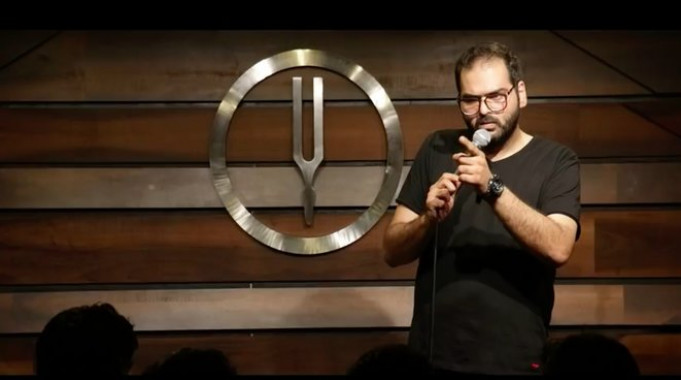Being funny is anti-national
The news of stand up comedian Kunal Kamra not being allowed to perform in the MS university of Vadodara, Gujarat does not come as a surprise. For all those who are familiar with his content and his style of enacting it, his being perpetually tagged as an 'anti-national' is a natural progression. Like all other public spaces, free speech sans dissent is acceptable to our current establishment. Kunal Kamra is an interesting example to delve into to make sense of the larger threats to free speech in the incipient stand-up comedy world.
Kamra shot to fame with his outrageously funny video called "Patriotism and Government" where he casts humorous aspersions on the government's obsession with the dissenters in the popular public space. He is one of the few performers who holds back no punches in calling the bluff of people right from PM Modi to his enthusiastic bhakts masquerading as intellectuals on prime time news debates. There is a whole host of comedians who take small pot shots under the name of 'he who must not be named', to people constantly referring to Modi as Modiji, lest they find themselves on someone's outrage list. These indirect attempts at observational comedy are rooted in hyper-anxiety and fear. At the same time, Kamra and no-nonsense performers like Varun Grover ( whose bit on the Padmavati ruckus and a new video on how and why Indians outrage went viral ) refuse to moderate their acerbic wit and humour.
In Kunal Kamra's case, his anti-establishment stand gets amplified because of a number of things. His very popular talk show called 'Shut Up Ya Kunal' is a case in point. It started off by interviewing young, national spokespersons of both the Congress and the BJP. However, all the interviews after that have people largely associated with what can be safely termed as left of centre public figures ranging from Jignesh Mewani, Shehla Rashid and Kanhaiya Kumar to Ravish Kumar and Siddharth Vardarajan.
It is a part of his free speech to give this online space to whosoever he feels merit that attention. These are exactly the divisive forces which were alluded to in the letter of former students to the vice chancellor of the MS university which later cancelled the show. As this is probably not enough to spark a massive emotional outrage, the letter also makes a mention of how the comedian 'mimics national anthem' and thereby defames India. A meta-narrative of this kind succeeds in giving that extra spice to an essentially mundane activity. This reflects on the reaction he gets for his other jokes like the one where he co-relates old age with conservatism. Even though the subject matter is not anti-establishment in this case, it still gets programmed to be seen from a patriotic lens. This continues as the anti-nationalism of his free speech starts affecting his other banal material like that of finding a taxi in Mumbai or a journey from Mumbai to Indore.
Anti-nationalism has become a moralising cloak which fends off not just anything critical of the establishment but also all those things that are even remotely linked to the famous hogwash trinity of 'Sanskaar, Aadarsh and Parampara.' The structure of this narration is intriguing as there is a perceptible religious veneer of non-questioning attached to it. Further, there is also an element of our civilization mirage of 'we being the producers and disseminators of knowledge are infallible' which helps in identifying anything suspicious as seditious.
Questioning is equal to maligning. As opposed to the written word, moving images accompanied by aural dissent on social media can cause massive havoc. Simply put, two million views of an 'anti-national' video does more damage than something printed in an English daily. Add the vernacular dimension to this, and it sends a strong, chill down patriotic spines. Seen against this backdrop, where free speech is rendered meaningless, it becomes deeply hypocritical to talk about 'Institutes of Eminence' when spaces of creativity and imagination are the primary targets of the self appointed cultural guardians. Access to institutional spaces and other public forums are vital for such mediums of free speech as the reach of the online world is still limited.
Most of Kamra's generation of stand up comics idolize Western comedians not just for their jokes or performances but also what they stand for. Be it the late George Carlin who even today gets watched by millions for his uncanny ability to make everyday disturbing things sound amusing, to the transgender comic Eddie Izzard who with his felicity with multiple languages has managed to reach a wider audience across the globe on issues of gender equality among others, to Dave Chappelle whose witty takes on racism has made people more aware of its layered toxicity, comedy has shown the potential of being a beacon of hope in our troubled times. They are a rare breed of torchbearers of the most accessible form of progressivism that one can think of where the underlying common thread is to question, to make people think and instigate curiosity of the unknown.
It is at its most convincing when jokes after brutal lynching and memes on mob violence start surfacing online, where even if it sounds bizarre, it effortlessly channels disgust and loathing into humour through brevity. Free Speech of this unabashed kind is the very antithesis of the culture of disciplined, regimented minds that is on full display in our country at the moment.
Surajkumar Thube has completed his MA in Political Science from Jamia Millia Islamia, New Delhi. He contributes to several periodicals.
